Fall 2021
| Course Number | Course Description | Professor |
|---|---|---|
| 204 | Business and Technical Writing | Multiple Instructors |
| 208 | Introduction to Public Speaking | Multiple Instructors |
| 221 | North American Indigenous Literature | Thompson |
| 222 | Introduction to World Literature | Stephens |
| 232 | Children's Literature | Klan |
| 233 | Literature and Film | Ruzesky |
| 240 | Ways of Reading | Armstrong |
| 273 | Ancients and Moderns | Atkinson |
Spring 2022
| Course Number | Course Description | Professor |
|---|---|---|
| 204 | Business and Technical Writing | Multiple Instructors |
| 208 | Introduction to Public Speaking | Multiple Instructors |
| 220 | Canadian Literature in Context | Moosa |
| 230 | Literature and Popular Culture | Burgoyne |
| 231 | Speculative Literature | Atkinson |
| 274 | Literary Traditions | Hagan |
| 280 | Book Club | Torkko |
| 201 | Film Studies | Armstrong |
Fall 2021 – Course Descriptions
ENGL 204: Business and Technical Writing
Multiple Sections

An introduction to business and technical communication skills with a focus on documents (such as letters and reports) and presentations. Topics may include planning, outlining, summarizing, presenting data, handling references, and editing. The course comprises several practical assignments, including a formal report and an oral presentation. ENGL 204 was formerly called ENGL 225; credit will not be granted for both courses.
ENGL 208: Introduction to Public Speaking
Multiple Sections

An introduction to public speaking that focuses on the creation, organization, and delivery of speeches for non-dramatic purposes. It provides the rhetorical principles of effective and ethical public speaking, offers opportunities to become familiar with different speaking situations, and attempts to instil a sense of the importance of public speech. ENGL 208 was formerly called THEA 203; credit will not be granted for both courses.
ENGL 221: North American Indigenous Literature
Professor Dawn Thompson

Photo by Mark Kaarremaa
“Na’tsa’maht Shqwaluwun” (“one heart, one mind”)* is the motto for this course, as it is about bringing together: bringing together people who are interested in Indigenous literatures; bringing together Western academic and Indigenous perspectives on literature and learning; and bringing together, in a respectful way, different cultures and ways of being in the world. Because that is what Indigenous literatures do: they find remarkable ways to merge the story and song tradition of oral cultures with the literary tradition of novels, poetry and drama in order to reach out to, and transform, readers from all cultures. Selected texts may include Maria Campbell, Stories From the Road Allowance People, Ellen Rice White, Legends and Teachings of Xeel’s The Creator, Leanne Simpson, Noopiming: The Cure for White Ladies, and Kim Senklip Harvey, Kamloopa: An Indigenous Matriarch Story.
*Note: I learned this term, and am still learning about its meaning, from the Office of Indigenous Education and Engagement at VIU.
ENGL 222: Introduction to World Literature
Professor Melissa Stephens
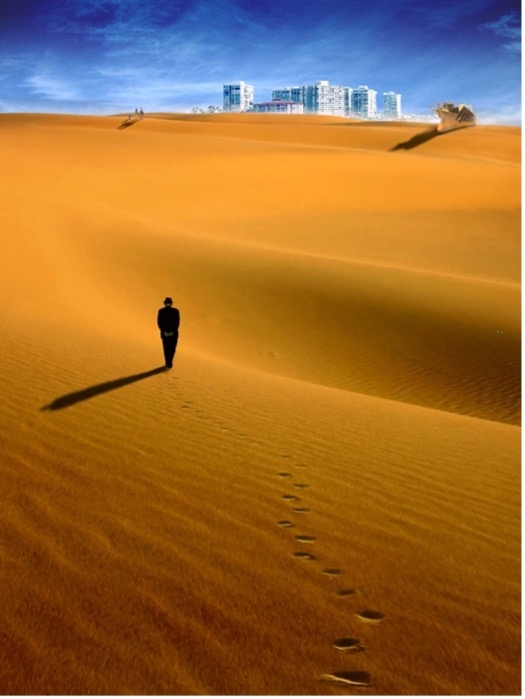
This course explores how notions of “home” and "health" may be unsettled by issues of social, economic, or environmental justice. All materials will be written in or translated into English and there will be emphasis placed on regions other than Canada, Britain, and the United States. Genre, period, and nationality will vary. Students may engage with works connected to places ranging from Trinidad, Nigeria, India, Cuba, and Italy, to the Marshall Islands, the Philippines, and the United Arab Emirates.
ENGL 232: Children's Literature
Professor Nicole Klan

Narratives of imagination and empathy in Children’s Literature
In this course, we’ll explore how works written for children are shaped by their historical and cultural context, share literary conventions, and reveal assumptions about childhood. We’ll read classic and contemporary works written in English, including picture books and graphic novels, to expand our understanding of the way authors represent children’s worlds, using both text and image, and consider how these works reveal and respond to current social concerns. Possible texts may include, but are not limited to, Alice in Wonderland (Carroll), The Fantastic Mr. Fox (Dahl), The Secret Garden (Hodgson Burnett), The City of Ember (DuPrau), George (Gino), Coyote sings to the Moon (King), El Deafo (Bell), Wild Robot (Brown), This One Summer (Tamaki & Tamaki), Esperanza Rising (Munoz Ryan).
ENGL 233: Literature and Film
Professor Jay Ruzesky
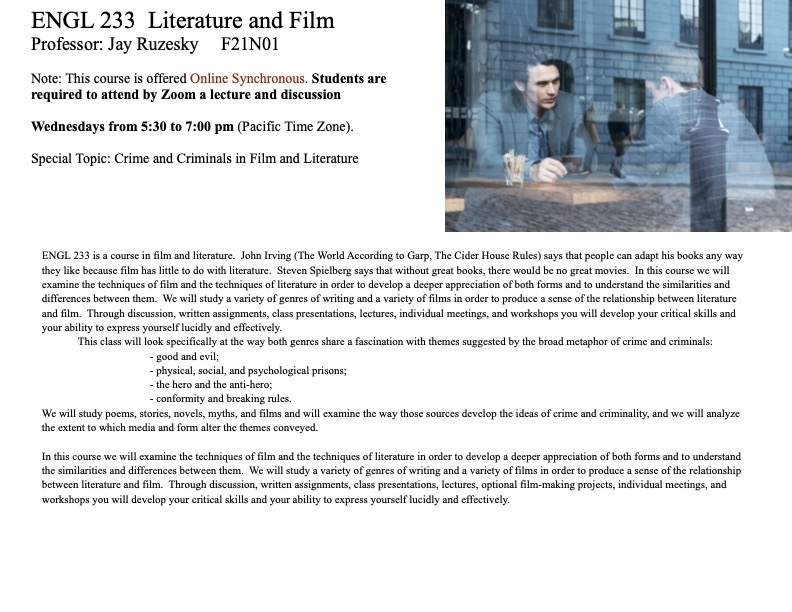
ENGL 240: Ways of Reading
Professor Clay Armstrong
A topical examination of different theoretical approaches to analyzing literature, this course familiarizes students with major critical terms and their practical application in the understanding of literature. In particular, students will consider the origins and practice of New Criticism, a way of reading literature that dominated the university classroom for much of the twentieth century. Rather than seeing poetry and fiction through the lens of cultural history or the intent of the author, New Criticism focuses more concretely on “close reading” of the text—the thing itself. We will explore key essays associated with the development of New Criticism and a range of literatures that draw attention to play between form and content, or texture and structure. Students will also explore other theoretical perspectives that New Criticism at once reacts to and inspires (e.g. New Historicism, Reader-Response, and Cultural Studies). Respective approaches to literary analysis will focus on the works of figures such as James Baldwin and Flannery O’Connor, whose various writings provoke a range of divergent criticisms. While exams will emphasize close reading of the primary literature, article critiques and the term paper will more broadly survey alternative ways of reading.
ENGL 273: Ancients and Moderns
Professor Anna Atkinson
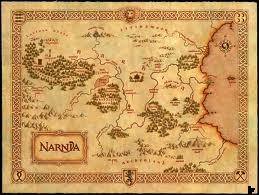
C. S. Lewis’s Narnia and the Re-creation of the Bible
One of the best-beloved of English children’s literary series, C. S. Lewis’s Chronicles of Narnia owes a lot of its structure and symbolism to a much older text: the Bible itself. In this course, we’ll read through the Chronicles, while reading parallel biblical texts, and consider the re-creation and interpretation of the biblical original that Lewis undertakes. We’ll celebrate the literary achievements of both texts, but we’ll ask some necessary questions as well. The assumption of white supremacy will come up; so will issues of class, age, and gender, in both the Bible itself and Lewis’s recreation. No biblical knowledge is necessary! Only a willingness to approach both Narnia and the Bible as texts worthy of—and needing!—a critical eye as they are read.
Spring 2022 – Course Descriptions
ENGL 204: Business and Technical Writing
Multiple Sections

An introduction to business and technical communication skills with a focus on documents (such as letters and reports) and presentations. Topics may include planning, outlining, summarizing, presenting data, handling references, and editing. The course comprises several practical assignments, including a formal report and an oral presentation. ENGL 204 was formerly called ENGL 225; credit will not be granted for both courses.
ENGL 208: Introduction to Public Speaking
Multiple Sections

An introduction to public speaking that focuses on the creation, organization, and delivery of speeches for non-dramatic purposes. It provides the rhetorical principles of effective and ethical public speaking, offers opportunities to become familiar with different speaking situations, and attempts to instil a sense of the importance of public speech. ENGL 208 was formerly called THEA 203; credit will not be granted for both courses.
ENGL 220: Canadian Literature in Context
Professor Farah Moosa
Email: farah.moosa@viu.ca
This class will meet face-to-face on the Nanaimo campus twice a week. Students are expected to attend classes on Tuesdays and Thursdays from 2:30-4:00pm.
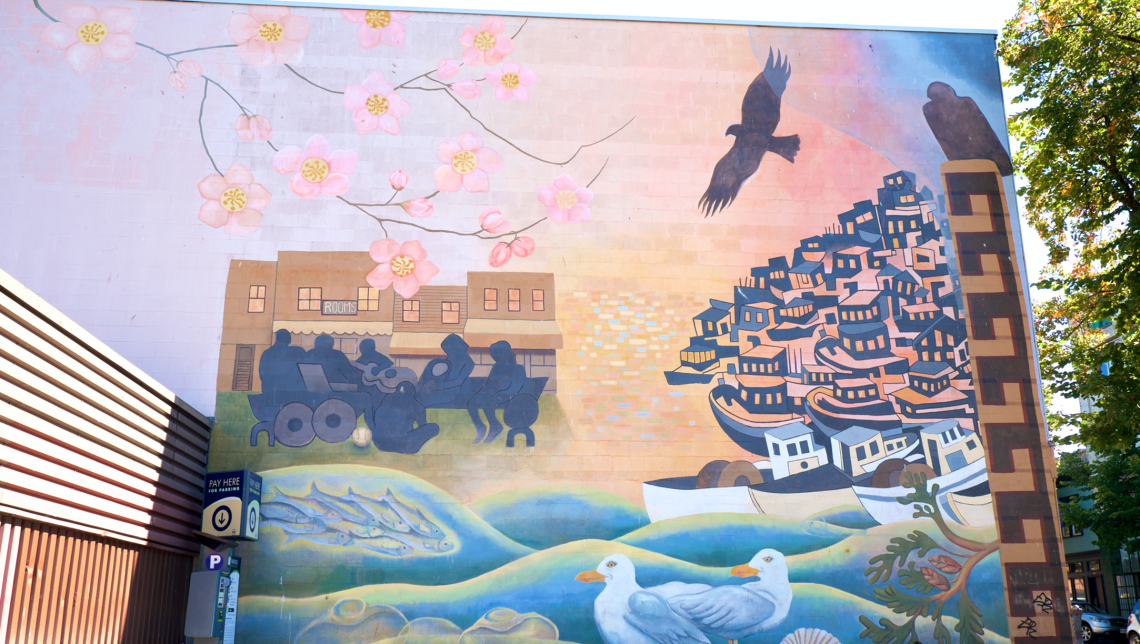
Joey Mallett and Rita Buchwitz’s Celebrating Community (2011) mural on Powell Street, Vancouver, BC. Photo credit: Raymond Kam, 2017.
What histories and cultural legacies do we inherit from our individual and shared pasts? What do we owe ourselves and others as a result of such inheritances? In this course, we will read contemporary Canadian literary works that help us think through our answers to such questions. Texts may include short stories from 2021 Scotiabank Gillar Prize finalist Angélique Lalonde’s Glorious Frazzled Beings, Joy Kogawa’s ground-breaking novel Obasan (1981), Richard Wagamese’s highly celebrated novel Indian Horse (2012), and selected poems from Renée Saklikar’s powerful collection, children of air india: un/authorized exhibits and interjections (2013). Drawing on current debates in memory, trauma, indigenous, and diaspora studies, we will discuss issues of colonialism, race, class, gender, and generational identity. As our authors deal with histories and cultural legacies that demand acknowledgment and action, we will also consider what our texts offer a local, national, and/or global audience who may or may not be familiar with their subject matter.
ENGL 230: Literature and Popular Culture
Professor Daniel Burgoyne
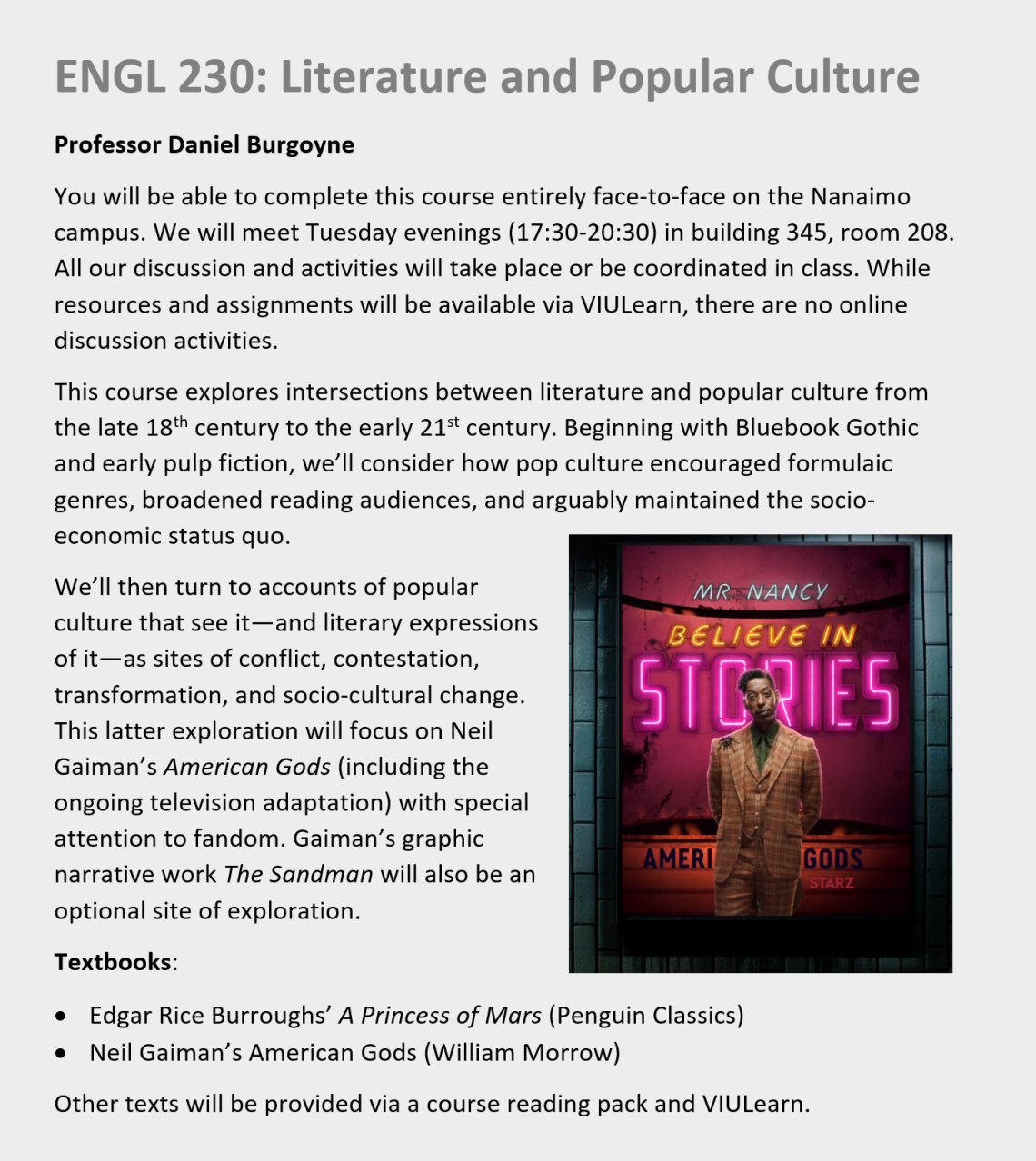
ENGL 231: Speculative Literature
Professor Anna Atkinson
English 231: Post-Carbon Fiction

This course begins with the understanding that fossil fuels are not only planet-killers in their contributions to Climate Change, but also finite resources. This means that, whether we like it or not, and whether we’re ready to face it or not, eventually our society will not be able to run on oil because there simply won’t be enough of it. This is the natural conclusion of a theory called “peak oil.” That term: "peak oil"--usually means something quite different from what people assume it means. Because of this, we will start the course with a close look at this term. Then we'll start looking at the ways in which various authors have imagined what a world beyond an industrial petroculture actually could look like. The approach we'll take has its roots in something Margaret Atwood said in a Quill and Quire interview in 1985 about her novel The Handmaid's Tale: "There is nothing in this book that hasn't already happened." In fact, apart from what Atwood terms "talking squids in space," there is very little in most speculative social science fiction that hasn't already happened--or that couldn't happen (or happen again). Thus, we’ll be looking, in the texts we read, for reflections of our own culture—and the implications of seeing (or not seeing) what these text reveal. What texts? Everything from E. M. Forster’s “The Machine Stops” to Octavia Butler’s Parable of the Sower to Douglas Coupland’s Player One to Suzanne Collins’s Hunger Games and beyond.
ENGL 274: Literary Traditions
Professor Sandra Hagan

Stories of the Sea
In The Sea: a Cultural History, John Mack argues for the distinctive experience of life on the oceans. Considering the sea as a place in itself rather than a gap between places opens up new possibilities for exploring human identities. In this course, we will trace out both the ways in which literary tradition has shaped representations of the seas at given periods and the ways in which oceanic tales offer access to extraordinary regions of human experience. Since as Mack notes, the seas are “arenas of transnational interchange,” we will navigate our way through texts launched from nations such as Canada, the UK, the US, and France, exploring where national borders sharpen and blur both on the seas and in ports of call (21). Themes will include colonialism, migration, survival, technology, the supernatural, and storytelling.
Texts may include Equiano’s The Interesting Narrative of the Life of Olaudah Equiano (selected chapters), Verne’s Twenty Thousand Leagues Under the Sea, Birch’s Jamrach’s Menagerie, Thúy’s Ru, and the film Jaws, along with other short readings, poems—and of course, a sea shanty or two!
ENGL 280: Book Club
Professor Deborah Torkko

Ultimately there is no test of literary merit except survival, which is itself an index to majority opinion.
– George Orwell
They can educate, delight, misinform, console, or simply pass the time. They share our vacations, accompany us through delays at the airport, help us escape from or bring us closer to the world we inhabit. Whether historical fiction, mystery novels, tales of glamour, or family sagas, for example, best sellers are an important part of the popular culture. Best sellers speak to national myths, shape tastes and values, and construct pictures of the world and the people who inhabit it.
This course asks you what kinds of books you enjoy reading: fiction, non-fiction, poetry? Which authors would you most recommend to friends, and which would you warn friends away from? What do you particularly like or dislike about these books? What kinds of books would you like to see more of? Why? This course also asks what the trends are today, and what do these tell us about the kinds of characters, settings, circumstances, and ideas readers are drawn to. In our examination of the books we love to read, we will consider the role literary awards plays in shaping trends, and we will consider the distinctions made between good literature (the literary novel) and literary pulp (popular fiction), asking how do we distinguish between the two? A novel absorbs us not only because of its content but because of how it is written. To this end, then, our discussions will emphasize form, style, and technique and will appeal to anyone who is interested in the close reading. Our readings will be drawn from national and international best seller lists and student-selected texts and may includes works by authors such as Ayad Akhtar, Paulo Coelho, Elaine Ferrante, Tove Jansson, Celeste Ng, Delia Owens, Jodi Picoult, Eden Robinson, Ali Smith, Ocean Vuong, Richard Wagamese, among others.
FILM 201: Film Studies
Professor Clay Armstrong
A continuation of Film 101, this course will strengthen critical perspectives on film by examining how narrative technique, acting, cinematography, editing, mise-en-scene and sound all work together to convey meaning. Students will study motion pictures that both establish and subvert filmmaking conventions in a range of genres including Science Fiction, Horror, Western, Gangster, and War. In addition to Genre Studies, we will introduce other schools in Film Theory and consider the complexities of literary adaptation. As well, the course will acknowledge how Netflix and other platforms have irreversibly changed our relationship with film. Screenings may include the works of Stanley Kubrick, Gwaai Edenshaw and Helen Haig-Brown, Joel and Ethan Coen, and Kathryn Bigelow. Viewer discretion is advised.
